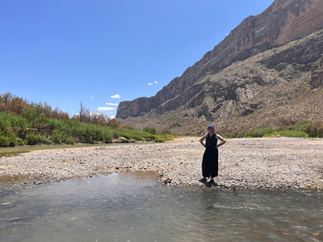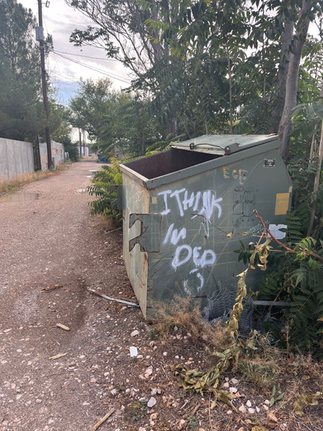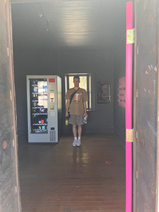The Marfa Intensive - August in West Texas
- kalyssarose

- Aug 25, 2023
- 4 min read
Updated: Aug 25, 2023
Grace and I got invited by Gregg Henry to go to The Marfa Intensive: hosted by Texas Tech. We had no idea what marfa was or what aphasia was. We knew our professor, Kelly, had worked with Texas Tech before, and that Mark Charney was a great friend of many of our friends. We simply said yes! and hopped on a plane sponsored by the Kennedy Center.
There had been Marfa intensives before. In the past they were devised by Rich Brown. I had the pleasure of taking a workshop from him. Super high energy, fast paced, successful, and creative performances have been built in past Marfa intensives, but this year was an experiment. Usually at the end of the two weeks, a show is produced.
This year was a trial and error research assessment where there was no harm in failing and no expectation for a final production. It was slow paced. Patient. Quiet, most of the time.
I think it ended up meaning a lot more to everyone who attended.

We explored theatre with people who have aphasia; a loss of communication, but not intelligence or memory. This includes input of language, output, reading, and writing. Everyone who has it is different. The challenge of a final performance then seemed impossible. For people who cannot use language in the art of theatre, you must get creative. We also had the help from the lovely Melinda Corwin and three speech pathology students to help us through all communication needs.
Marfa itself had the perfect landscape for this creative process. The town lives in a balance of presence and absence. You cannot escape the sky or inevitability. You cannot escape the shifting wind or fluidity of people. There is permanence in the rocks, the locals, the history, and the art, but Marfa is constantly changing. People who have aphasia cannot “undo” their aphasia. They can get better, but it won’t be the same. They are very similar to Marfa. You cannot change what it is. It is vast and lonely and isolated and makes you feel so small, but there is beauty hidden if you have the patience and the curiosity to see it.
This natural architecture was the perfect setup to properly tell the stories of the people with aphasia. We had four aphasia patients, their caregivers, theatre artists, and speech pathology students. The room was filled with people who were excellent communicators and those who needed a voice. Instead of rambling on about how amazing it was, let me share with you what I learned. Straight from my notebook:
Rod is funny and a gentleman. He used to rope cows and wears his trophy belt buckle every day. He wishes his children would visit him more. He loves his wife very much.
Debbie wants to go back to teaching. She used to go to clubs with her brother and is a really good dancer. She also used to play soccer. Now, she enjoys card games with friends.
Malik loves his husband. It makes him quite sad when people won’t include him in conversations anymore, because they do not understand. He wants to go back to public speaking.
Rene loves his dog, Raider. He named him after the Texas Raiders. He also won a 62 oz steak eating contest. He believes that was his "moment." He loves his family and God.

These people have been stripped of their identity because they cannot communicate their wishes, dreams, likes, dislikes, or unfairness of the world. They cannot communicate how they used to or how the world wants them to. Through theatre games and exercises, we not only learned about the people with aphasia but with the other students and artists. We all trusted each other with our stories and had the patience and curiosity to listen.
Sahar Assaf (deviser/director for this intensive) created an inquiring, open, patient and present space that was filled with humans who all wanted to share with each other. She gave multiple methods of healing through visual art, games, and non-verbal acting. She created questions that were good enough to get a deeper answer. She asked questions that no one was asking these people. We interviewed the caregivers. No one had asked them how they were doing in far too long. Caregivers also need care. We asked the people with aphasia how it feels to have aphasia. No one had ever tried so hard to understand them. No one had been asking them these questions. I learned about these real people that have to go back to real lives where most people don’t have the time to listen to them.
They taught me how to slow down. Sometimes solutions are not the solution. Sometimes listening is. To listen you need something to listen to, and in which case, you need good questions, good prompts, good ears, and open arms. We all contributed to this recipe for aphasic theatre.
Yes, we did have a final performance. It was small, with scripts in hand, and it was beautiful.
Even in silence, you can listen, understand, and empathize with those around you. I am sending Debbie a postcard now with a lot of doodles. I may be traveling to Turkey to see Erk in his vacation home. Grace and I will be eating dinner with Malik and Jamil when we make it to Chicago. I made connections with people who I will never forget.
I will never forget Marfa, Texas.































Comments